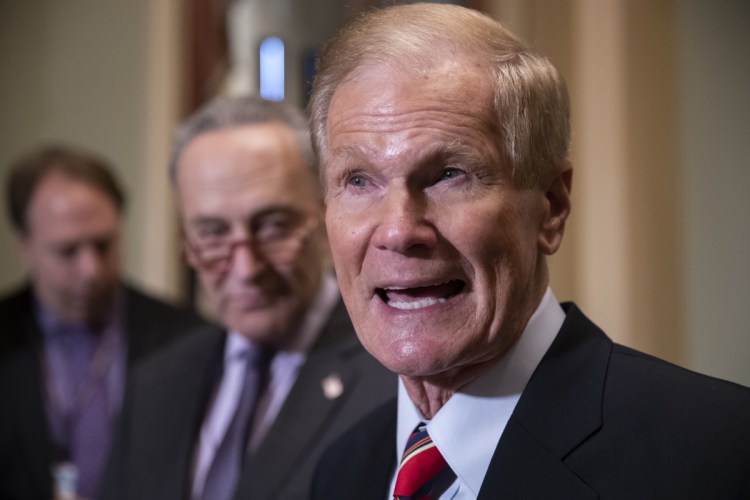TALLAHASSEE, Fla. — Democratic Sen. Bill Nelson, a Florida political icon whose career highlight may have been a trip on the space shuttle, conceded his bitterly close re-election bid to Republican Rick Scott on Sunday, ceding a razor-thin race to Florida’s outgoing governor after a tense and sometimes turbulent recount.
Nelson gave up his fight to maintain his longevity in power after days of acrimony and tense recounting leading to a midday Sunday deadline for Florida’s counties to turn in their official results. Florida will not officially certify the final totals until Tuesday, but the totals showed Nelson trailing Scott by slightly more than 10,000 votes.
“It has been a rewarding journey as well as a very humbling experience,” said Nelson in a statement. “I was not victorious in this race but I still wish to strongly re-affirm the cause for which we fought: A public office is a public trust.”
The stunning close of nearly two weeks of high political drama in the presidential swing state likely spelled the end of the political career of the 76-year-old Nelson. First elected to Congress 40 years ago, Nelson had been a Democratic survivor in an era when Republicans swept to power in Florida. He went on to his first election in the U.S. Senate in 2000 and was making his fourth attempt at re-election.
For Scott, who was urged by President Donald Trump to challenge Nelson, it was his third narrow victory after jumping into politics eight years ago.
“Now the campaign truly is behind us, and that’s where we need to leave it,” said Scott in a statement. “We must do what Americans have always done: come together for the good of our state and our country. My focus will not be on looking backward, but on doing exactly what I ran on: making Washington work.”
Trump congratulated Scott on his victory on Twitter: “From day one Rick Scott never wavered. He was a great Governor and will be even a greater Senator in representing the People of Florida. Congratulations to Rick on having waged such a courageous and successful campaign!”
After it became clear that the race between Nelson and Scott would head to a legally required recount, Nelson and Democrats filed several lawsuits that challenged everything from Scott’s authority over the state’s election division to deadlines for mail-in ballots.
The Nelson campaign managed to secure only one win in court. U.S. District Judge Mark Walker gave voters until 5 p.m. on Saturday to fix their ballots if they haven’t been counted because of mismatched signatures. Nearly 5,700 ballots were rejected because signatures on ballot envelopes did not match signatures kept on file by election officials.
Walker rejected a request by Democrats to automatically count all the ballots with mismatched signatures. He also rejected a request to waive deadlines for domestic mail-in ballots even if they had been mailed prior to Election Day. Under Florida law, ballots mailed inside the United States must be in election offices by 7 p.m. on Election Day in order to count. Overseas ballots are counted if they are received up to 10 days after the election.
The bruising recount followed an equally negative campaign.
While the two candidates disagreed on key issues, they focused their campaigns primarily on character and competence. Scott repeatedly bashed Nelson as an ineffective senator, while Nelson branded Scott as a follower of Trump who had used the governor’s office to pad his wealth.
Scott, a one-time health care executive and multimillionaire, first jumped into politics eight years ago, when he rode a tea party wave into the governor’s office. Term limits prevented him from seeking re-election.
As the state’s chief executive, Scott focused on job creation and turning around Florida’s economy after the recession. But instead of touting that record during his campaign for the U.S. Senate, Scott primarily hammered Nelson. He used more than $60 million of his money on a blistering set of ads.
When Scott first jumped in, the contest was seen as one of the marquee races in the nation. It was soon overshadowed by the governor’s race: a vitriolic competition between Republican Ron DeSantis and Democrat Andrew Gillum that became a proxy battle between Trump and his Democratic opponents.
The two candidates disagreed on issues ranging from gun control to environmental policy to health care. Nelson was a strong supporter of the federal health care overhaul pushed into law by President Barack Obama, while Scott had called for the law to be repealed and replaced.
Nelson and his allies ran ads that questioned Scott’s ethics, pointing to his ouster as chief executive of health care giant Columbia/HCA amid a federal fraud investigation. Although Scott was never charged with any wrongdoing, the health care conglomerate paid a then-record $1.7 billion fine for Medicare fraud.
Democrats also questioned whether Scott had conflicts while governor since both he and his wife invested in companies that do business in Florida, including a subsidiary of the company that owns Florida’s largest electric utility. Scott has maintained he does not control his holdings.
Copy the Story LinkSend questions/comments to the editors.



Success. Please wait for the page to reload. If the page does not reload within 5 seconds, please refresh the page.
Enter your email and password to access comments.
Hi, to comment on stories you must . This profile is in addition to your subscription and website login.
Already have a commenting profile? .
Invalid username/password.
Please check your email to confirm and complete your registration.
Only subscribers are eligible to post comments. Please subscribe or login first for digital access. Here’s why.
Use the form below to reset your password. When you've submitted your account email, we will send an email with a reset code.